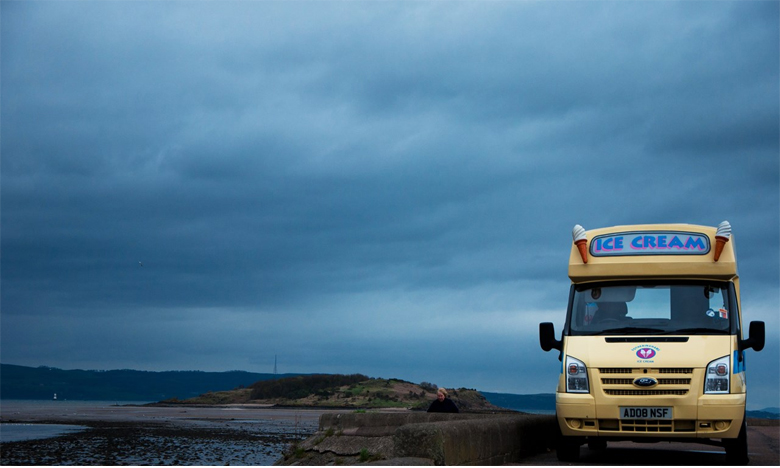For most of us, the sound of an ice cream truck brings back memories of lazy summer afternoons and children rushing to buy a chocolate cone. But 30 years ago in Scotland, an ice cream van was a sign of danger. Friendly competition is natural among street vendors, but in Glasgow, in the ’80s, ice cream van drivers took things to a whole new level of violence in what came to be known as “the Ice Cream Wars.”
It began with van owners insulting newcomers on their turf and escalated into near-daily conflicts, with ice cream vendors raiding one another’s trucks. Of course, the brutality wasn’t just about the right to sell frosty treats: Glasgow’s ice cream vans had become mobile fronts for rival criminal gangs selling stuff like cigarettes, hard drugs and stolen stereos.
INTIMIDATION ESCALATED FROM VANDALIZING COMPETITORS’ TRUCKS TO BEATING UP ICE CREAM SELLERS WHO REFUSED TO FOLLOW ORDERS.
That such hostility might lurk inside colorfully painted ice cream trucks might seem comical. But even for the inhabitants of Scotland’s most violent city, it was getting out of hand. Intimidation escalated further, from vandalizing competitors’ trucks to beating up ice cream sellers who refused to follow orders. Meanwhile, the police seemed so incapable or unwilling to address the problem that locals took to calling them the “serious chimes squad” instead of the Serious Crime Squad.
Then came the shotgun attack against 18-year-old Andrew Doyle when he was inside his van. Doyle, a local vendor known as Fat Boy, was among the few who refused to distribute drugs along his route. Someone shot at his windshield twice that night, but it wasn’t enough to scare Doyle off. So, on April 16, 1984, the front door of his family’s apartment was set on fire. He was sleeping inside, along with his parents, two brothers, sister and 18-month-old nephew. No one survived.
The killing shocked Scotland into action, at last, and the police rushed to find the culprits. After interrogating hundreds of people, they arrested Thomas Campbell and Joe Steele, convicted them for the death of Doyle and his family, and sentenced them to life in prison. But the sentence was just the beginning of a legal war that would capture the nation’s attention for two decades and become one of the most contentious cases in recent Scottish history.
Campbell and Steele were declared guilty by a unanimous jury, even though their lawyers managed to uncover several pieces of evidence that seemed to undermine the accusations, like the unlikely fact that four police officers remembered, word for word, an identical “confession” from Campbell. The “mass hysteria” around the Doyle family’s murder “meant that there was real prejudice that existed from the moment they were arrested until the end,” Aamer Anwar, Campbell’s lawyer, told OZY. It wasn’t until 1992 that the case came undone, when William Love — a crucial witness who said he’d seen the two men plotting the attack on Doyle — admitted he had lied under oath to avoid prison.
“IT IS A DISGRACE. THEY TOOK AWAY THE BEST YEARS OF THEIR LIVES …”
After Love’s confession, the two prisoners fought the verdict, one appeal after the next. Campbell attracted media attention by staging a hunger strike that nearly killed him, while Steele escaped from prison three times and handcufffed and glued himself to Buckingham Palace. Finally, in 2001, after 17 years in prison, the pair was set free, and in 2004 their convictions were quashed. Lord Gill, Scotland’s most senior judge, called the two men victims of a “miscarriage of justice.” “It is a disgrace,” said Anwar. “They took away the best years of their lives, scarred them for life.”
After leaving prison, a saddened Campbell told reporters, “There is no jubilation, there’s no happiness, because I feel there are only losers in this case. Everybody has lost. The Doyles have lost their family, we’ve lost our lives in prison, and for 20 years, justice has lost.” Even today, a decade later, the tragic story of the Ice Cream Wars is still not over. Scotland Police told OZY that the case is closed. But still, if these two men were not guilty, then whoever killed the members of the Doyle family is still free.
Ice cream, anyone?

